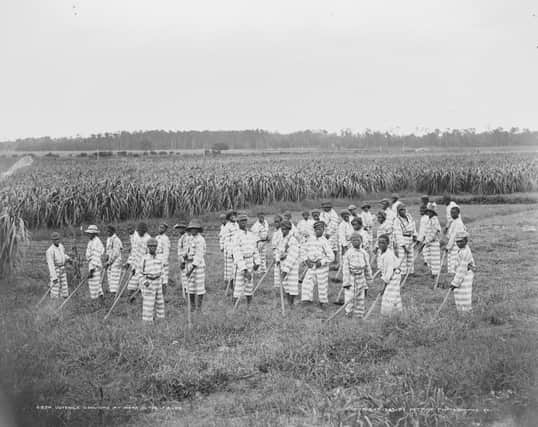Boris Johnson, chain gangs and unlocking the language of crime and punishment – Susie Dent


Nearly two centuries on, Boris Johnson last week announced the government’s new crime plan, whose measures include making those guilty of anti-social behaviour repay their debt to the public in “fluorescent-jacketed chain gangs”.
The status of the chain gangs of Van Diemen’s Land was well below that of the “relief gangs” (“men who have conducted themselves properly after long probation”) and “educated convicts” who would be employed in gardening and fencing. Any convict, however, was liable to be punished “by removal to the chain gang, and by flagellation”.
Advertisement
Hide AdAdvertisement
Hide AdA few decades on, the term “chain gang” became rooted in slavery, and, later, in what was known as “convict leasing” for work on thousands of miles of railroads. The latter led many to judge that the men in chains, most of them black, had moved from being a plantation owner’s property to slaves of the state instead.
As Boris Johnson is surely aware, terms such as “chain gang” cast a long and clear shadow, harking back to an era where physical punishment was the norm. But behind much of our language lie unexpected stories of crime and retribution.
The soliciting of votes, for example, usually involves “canvassing”. Few might guess that the original meaning of the term, in the 16th century, was to punish someone by tossing them roughly in a heavy canvas sheet. From here grew the figurative idea of criticising someone, then of scrutinising them, and finally to sounding them out. Not dissimilarly, “running the gauntlet” was a punishment exacted in the Navy whereby a felon was forced to run between two columns of troops as they attempted to beat him with sticks or ropes. “Gauntlet” comes from the Swedish gata, “lane”, and lopp, “running”.
Running on a treadmill in the modern gym bears thankfully little resemblance to the tortuous Tread Mills of Victorian prisons, which rotated around a horizontal axis and required inmates to step upwards continually. Like those in an Escher painting, they were effectively walking an endless staircase.
Looking back further still, we have the original “ordeals”, notorious tests of guilt or innocence. Trial by ordeal involved subjection to extreme pain by fire or water (notably in the witch-hunts of the 16th and 17th centuries) – survival was taken as a divine proof of innocence. “Ordeal” is a relative of the German urteil, “judgement”.
Ancient punishments were no less deadly. The word “decimate” famously began with the Roman punishment of fearful or mutinous soldiers by rounding them up in groups of ten, with lots drawn amongst each group to select one man who would be duly put to death by the other nine.
In ancient Athens, to “ostracise” a criminal or disobedient citizen was to banish them from the city for ten years – their fate would be decided by senators who wrote their name on pieces of broken pottery, ostraka in Greek.
Advertisement
Hide AdAdvertisement
Hide AdThe victims of such punishments would, in the Middle Ages, be termed “obnoxious”, an adjective that has lost much of its sting but which ultimately contains the Latin ob, “subject to”, and noxa, “harm”. And while today we are more likely to encounter the word “penalty” on a parking fine or speeding ticket, its origins are more harrowing, coming from the Latin poena, “suffering”.
When it comes to crime and punishment, the 1934 Westminster Review decides that, in the end, “every tree is known by its fruit, and every system by its working” - as will be the case for Boris Johnson’s crime bill. Ultimately the aim of retribution, leaving morality aside, is that its recipients will feel remorse. Language suggests that things are never that simple: at the heart of the word “remorse” is the Latin remorsum: a “biting back”.
Susie Dent is a lexicographer and etymologist. She has appeared in Dictionary Corner on ‘Countdown’ since 1992. Her book, ‘Word Perfect: Etymological Entertainment for Every Day of the Year’, is out now
A message from the Editor:
Thank you for reading this article. We're more reliant on your support than ever as the shift in consumer habits brought about by Coronavirus impacts our advertisers.
If you haven't already, please consider supporting our trusted, fact-checked journalism by taking out a digital subscription.
Comments
Want to join the conversation? Please or to comment on this article.